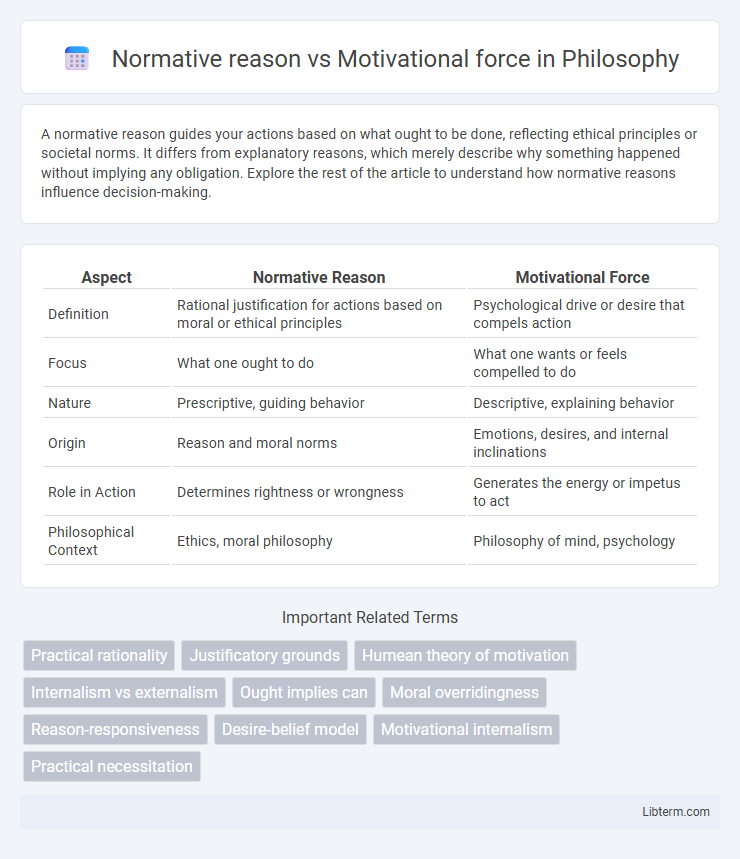A normative reason guides your actions based on what ought to be done, reflecting ethical principles or societal norms. It differs from explanatory reasons, which merely describe why something happened without implying any obligation. Explore the rest of the article to understand how normative reasons influence decision-making.
Table of Comparison
| Aspect | Normative Reason | Motivational Force |
|---|---|---|
| Definition | Rational justification for actions based on moral or ethical principles | Psychological drive or desire that compels action |
| Focus | What one ought to do | What one wants or feels compelled to do |
| Nature | Prescriptive, guiding behavior | Descriptive, explaining behavior |
| Origin | Reason and moral norms | Emotions, desires, and internal inclinations |
| Role in Action | Determines rightness or wrongness | Generates the energy or impetus to act |
| Philosophical Context | Ethics, moral philosophy | Philosophy of mind, psychology |
Understanding Normative Reasons
Normative reasons provide justifications for actions based on what one ought to do, independent of whether these reasons motivate the individual. Understanding normative reasons involves analyzing the principles, values, or moral rules that establish the correctness of an action. This distinction highlights that having a normative reason does not guarantee motivational force, as individuals may recognize reasons without being compelled to act on them.
Defining Motivational Force
Motivational force refers to the psychological drive or internal impetus that compels an individual to act according to a given reason or norm. Unlike normative reasons, which justify or prescribe actions, motivational force explains why an individual is moved to translate those reasons into behavior. Understanding motivational force is crucial for analyzing how beliefs, desires, or intentions convert normative reasons into actual decisions and actions.
Distinguishing Normative Reasons from Motivational Force
Normative reasons are objective justifications that explain why an action ought to be taken, whereas motivational force refers to the subjective drive compelling an individual to act. Distinguishing normative reasons from motivational force involves recognizing that a person can acknowledge a normative reason without it necessarily influencing their motivation or behavior. This separation highlights that understanding what one ought to do does not always translate into what one is motivated to do.
The Role of Rationality in Action
Normative reasons provide justifications that rational agents recognize as valid grounds for action, influencing decisions through principles and moral obligations. Motivational force refers to the capacity of these reasons to actually prompt or drive an agent to act, linking rational evaluation to behavior. Rationality plays a crucial role by bridging normative reasons with motivational force, ensuring that agents not only understand what they should do but are also motivated to perform those actions.
How Normative Reasons Guide Behavior
Normative reasons guide behavior by providing individuals with justifications that ought to influence their actions, grounded in principles, values, or rational assessments. These reasons serve as objective norms, differentiating from mere desires or inclinations that drive motivation without evaluative force. Understanding how normative reasons operate reveals the essential link between rational deliberation and ethical or practical decision-making processes.
Psychological Foundations of Motivation
Normative reasons represent the justifications or rational grounds that explain why an action ought to be performed, grounded in moral or logical principles, while motivational force refers to the psychological drive that compels individuals to act based on desires or goals. Psychological foundations of motivation explore how internal states, such as needs, drives, and emotions, interact with cognitive appraisals of normative reasons to generate motivation. Understanding the interplay between normative reasons and motivational force elucidates the mechanisms behind decision-making and goal-directed behavior in motivational psychology.
Interplay Between Normativity and Motivation
Normative reasons provide justifications for actions by indicating what one ought to do, while motivational force refers to the capacity of these reasons to actually prompt behavior. The interplay between normativity and motivation hinges on how normative reasons translate into motivational force, influencing whether agents act in accordance with ethical, practical, or rational considerations. Understanding this dynamic is crucial for comprehending how moral obligations or rational prescriptions can effectively shape decision-making processes.
Philosophical Debates: Reasons vs. Motivation
Normative reasons provide justifications for actions based on what one ought to do according to moral or rational standards, whereas motivational force refers to the psychological drive that actually prompts behavior. Philosophical debates center on whether normative reasons inherently possess motivational force or if motivation requires separate causal factors beyond rational justification. This discussion critically examines the connection between what justifies actions and what compels individuals to act, influencing theories in ethics and philosophy of mind.
Practical Implications in Ethics and Decision-Making
Normative reasons provide justifications for actions based on moral principles, guiding individuals on what they ought to do in ethical decision-making. Motivational force refers to the actual influence of these reasons in prompting agents to act, highlighting the gap between recognizing reasons and being motivated by them. Practical implications arise when ethical frameworks must consider not only what counts as a reason but also how to effectively translate normative reasons into motivational force to ensure moral behavior.
Bridging the Gap: Aligning Reasons and Motivation
Bridging the gap between normative reasons and motivational force involves understanding how individuals internalize external standards as personal incentives to act. Research in philosophy and psychology reveals that aligning normative reasons with intrinsic motivations enhances moral behavior and decision-making consistency. By integrating normative principles into the motivational framework, cognitive dissonance decreases, promoting coherence between what people ought to do and what they are motivated to do.
Normative reason Infographic

 libterm.com
libterm.com